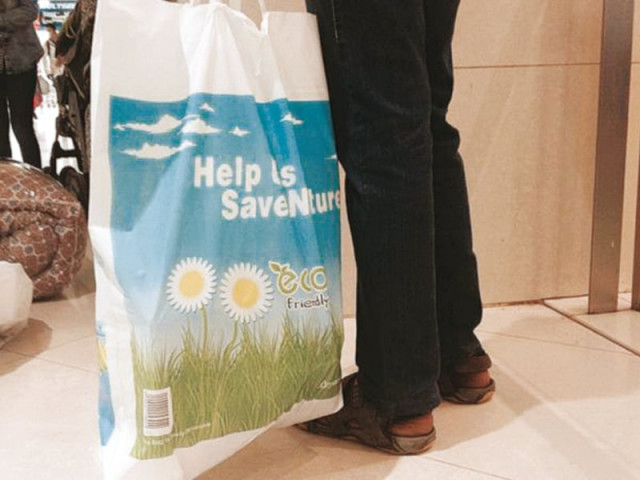Go biodegradable: Bag the plastic
Non-biodegradable bags are a ticking bomb for the environment and should be replaced.

Non-biodegradable bags are a ticking bomb for the environment and should be replaced. PHOTOS : SADAF PERVEZ AND MANAHYL KHAN

Almost 55 billion bags are manufactured and used in Pakistan annually, according to estimates by the Pakistan Environment Protection Agency (PEPA). The average consumption of plastic bags was estimated at 397 bags per person, which is roughly one bag per head each day. Since plastic does not biodegrade (be decomposed by bacteria or other living organisms) the remnants of used plastic remain forever.

Oxo-biodegradable plastic offers a feasible substitute for the plastic plague as it significantly reduces the lifetime of discarded waste. This environmentally friendlier plastic is made by blending an additive (metal salts, none of which are heavy metals) into the plastic during the extrusion process. The additive causes the molecular structure of plastic to break down when exposed to oxygen or sunlight. This kind of plastic degrades at a faster rate until it has fully decomposed into biomass.
“The regulations on prohibition of non-degradable plastic products are prepared in consultation with all stakeholders, especially the association of plastic producers,” explains Asif Shuja, the director-general at PEPA. According to Shuja, switching over to oxo-biodegradable plastic should not create problems for those looking for change since its production does not involve any change in machinery or raw material, except an addition of a one per cent dosage of additive. “[Therefore], plastic producers should not hesitate.”

The alternative does not require any drastic changes in pricing either. “The cost of switching to the environmentally friendly bag is negligible. The average cost goes up by less than five percent for standard packaging. For more complicated packaging, the cost is even less,” explains Ahsan Ijaz, director of ACC Polymers, the founding company of the oxo-biodegradable plastic sector in Pakistan.
Still, only a few plastic producers have complied with the bans, which have been repeatedly enforced in the past — the first one in 1994 by the Sindh government. “Most manufacturers in the plastic industry are unregistered. Thus, [they] do not exist on the books of the government. Since the government can only check registered factories; unregistered ones have a free hand,” Ijaz says.
When an elderly fruit cart vendor was asked why he was loyal to non-degradable bags, he said, “At least I am using plastic — I’m saving trees.” His reasoning was informed by an altogether different experience. “Trees are being cut at an alarming rate near my village in the north,” he complained. “Nobody asks them.”

While cart vendors are still far from taking the environmentally friendly route, companies like ICI Pakistan have shown a willingness to discourage the use of paper and replace it with oxo-biodegradable technology. The words, ‘This is a 100% oxo-biodegradable bag’ are found on ICI’s official envelopes, calling out for customers’ attention. The company has used 87,500 oxo-biodegradable bags in place of paper envelopes so far. This initiative helped them save 9,300 gallons of water, 23 trees, four cubic yards of landfill space, three barrels of oil and 5,453 kilowatt hours of electricity.
Other companies like BATA Pakistan, Lahore Waste Management Company (including the Metro Bus System), Jalal Sons, Utility Stores Corporation, Seasons Foods, Hyperstar and KFC are also joining the camp for eco-friendly packaging.

Despite a number of companies coming onboard for eco-friendly packaging, it is still critical to provide the conditions necessary to ensure degradation. The oxo-biodegradable bag does not degrade in the absence of oxygen and UV light and hence it is unlikely to break down in a landfill, where much of the plastic usually ends up.
“Yes, there are some apprehensions but we have to ensure proper disposal of used bags for complete degradation,” says Shuja. “Unlike the traditional bag, at least these bags do not emit methane in anaerobic conditions in landfill sites even if degradation slows.”
Environmentalists are always thinking of ways to minimise waste and maximise use to reduce damage to the environment. Reusing bags that have once been bought because it avoids the purchase of another is one of the most viable options. Supermarts like Hyperstar are pressing their customers to join the movement indecisively by either purchasing a biodegradable bag for Rs15 with an average usage life of 16 to 20 months or opt for the ‘Green Bag’ for Rs89 that comes with free replacement of damaged bags.

For some, the practise is similar to going back to a less complicated time. “My granny used to carry a jute bag whenever she went to shop. It is commendable that our habits are being changed for good,” says Naila, a regular customer at Hyperstar.
Sadaf Parvez is a freelance writer and blogger. She tweets @sadafpervez
Published in The Express Tribune, Sunday Magazine, December 15th, 2013.



















COMMENTS
Comments are moderated and generally will be posted if they are on-topic and not abusive.
For more information, please see our Comments FAQ